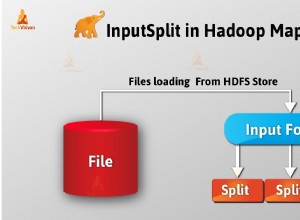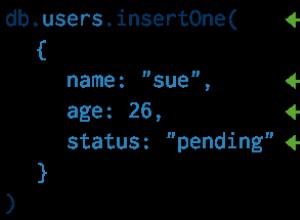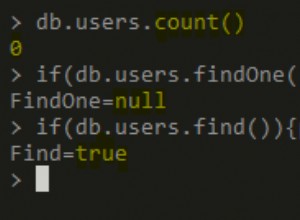Bueno, por supuesto, puedes usar $push
y $first
en un $group
para que el documento vuelva a ser lo que era:
db.getCollection('matchWiseData').aggregate([
{ "$match":{
"matchData.matchId":{"$in":[ObjectId("57175c25561d87001e666d12")]}
}},
{ "$unwind":"$matchData"},
{ "$match":{
"matchData.matchId":{"$in":[ObjectId("57175c25561d87001e666d12")]}
}},
{ "$group": {
"_id": "$_id",
"venueId": { "$first": "$venueId" },
"companyId": { "$first": "$companyId" },
"cardTypeId": { "$first": "$cardTypeId" },
"matchData": { "$push": "$matchData" }
}}
])
Pero probablemente debería haber usado $filter
con MongoDB 3.2 en primer lugar:
db.getCollection('matchWiseData').aggregate([
{ "$match":{
"matchData.matchId":{"$in":[ObjectId("57175c25561d87001e666d12")]}
}},
{ "$project": {
"venueId": 1,
"companyId": 1,
"cardTypeId": 1,
"matchData": {
"$filter": {
"input": "$matchData",
"as": "match",
"cond": {
"$or": [
{ "$eq": [ "$$match.matchId", ObjectId("57175c25561d87001e666d12") ] }
]
}
}
}
}}
])
Y si tuviera al menos MongoDB 2.6, aún podría haber usado $map
y $setDifference
en cambio:
db.getCollection('matchWiseData').aggregate([
{ "$match":{
"matchData.matchId":{"$in":[ObjectId("57175c25561d87001e666d12")]}
}},
{ "$project": {
"venueId": 1,
"companyId": 1,
"cardTypeId": 1,
"matchData": {
"$setDifference": [
{ "$map": {
"input": "$matchData",
"as": "match",
"in": {
"$cond": [
{ "$or": [
{ "$eq": [ "$$match.matchId", ObjectId("57175c25561d87001e666d12") ] }
]},
"$$match",
false
]
}
}},
[false]
]
}
}}
])
Eso está perfectamente bien cuando cada elemento de la matriz ya tiene un identificador "único", por lo que la operación "establecer" simplemente elimina el false valores de $map .
Ambas son formas de "filtrar" el contenido de una matriz sin usar $unwind
N.B :No estoy seguro si realmente entiendes que $in
se utiliza para hacer coincidir una "lista de condiciones" en lugar de tener que hacer coincidir las matrices. Por lo general, la condición puede ser simplemente:
"matchData.matchId": ObjectId("57175c25561d87001e666d12")
Donde en realidad solo tiene un valor único para hacer coincidir. Usas $in y $or cuando tienes una "lista" de condiciones. Los arreglos en sí mismos no hacen ninguna diferencia para el operador requerido.




